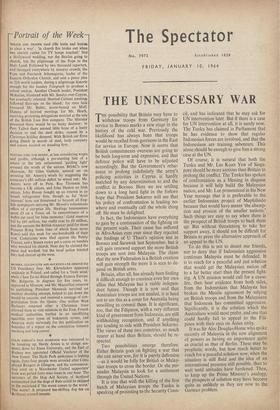THE UNNECESSARY WAR
THE possibility that Britain may have to -withdraw troops from Germany for service in Borneo marks a new stage in the history of the cold war. Previously the likelihood has always been that troops would be recalled from garrisons in the East for service in Europe. Now it seems that British commitments overseas are going to be both long-term and expensive, and that defence policy will have to be adjusted accordingly. But the Government's reluc- tance to prolong indefinitely the army's policing activities in Cyprus is hardly matched by any determination to end the conflict in Borneo. Here we are settling down to a long hard fight in the forlorn hope that President Sukarno will see that his policy of confrontation is leading no- where and eventually call the whole thing off. He must be delighted.
In fact, the Indonesians have everything to gain by a continuation of the fighting on the present scale. Their cause has suffered in Afro-Asian eyes ever since they rejected the findings of U Thane's opinion test in Borneo and Sarawak last September, but it will gain renewed support the more British troops are sent into Malaysia. The claim that the new Federation is a British creation will gain strength the more it is seen to de- pend on British arms. Britain, after all, has already been finding it difficult enough to convince even her own allies that Malaysia has a viable indepen- dent future. Though it is now said that Australian troops are not needed, it is hard not to see this as a cover for Australia being unwilling to commit them. It is significant, too, that the Filipinos, with a very different kind of government from Indonesia, are still withholding recognition, and if anything are tending_ to side with President Sukarno. The views of these two countries, so much nearer at hand than Britain, should be re- spected.
Two possibilities emerge therefore. Either Britain goes on fighting a war that she can never win, for it is purely defensive —as it would be folly for British or Malay- sian troops to cross the border. Or she per- suades Malaysia to look for a settlement through the United Nations. It is true that with the killing of the first batch of Malaysian troops the Tunku is speaking of protesting to the Security Coun- cil, and has indicated that he may ask for UN intervention later. But if there is a case for UN intervention at all, it is surely now. The Tunku has claimed in Parliament that he has evidence to show that regular Indonesian forces are involved, and that the Indonesians are training saboteurs. This alone should be enough to give him a strong - case at the UN.
Of course, it is natural that both the Tunku and Mr. Lee Kuan Yew of Singa- pore should be more anxious than Britain to prolong the conflict. The Tunku has spoken of confrontation as a blessing in disguise because it will help build the Malaysian nation, and Mr. Lee pronounced in his New Year message that it is preferable to the earlier Indonesian project of Maphilindo because that would have meant 'the absorp- tion and erosion of the smaller nations.' Such things are easy to say when there is the prospect of British troops to back them up: But without threatening to take her support away, it should not be difficult for Britain to press the alternative approach of an appeal to the UN.
To do this is not to desert our friends, nor to deny that if Indonesian aggression continues Malaysia must be defended. It is to reach for a peaceful and just solution that would get the Malaysian nation off to a far better start than the present fight- ing. A UN mission would call for a cease- fire, then hear evidence from both sides, from the Indonesians that Malaysia has broken the Manila agreement by relying on British troops and from the Malaysians that Indonesia has committed aggression. Significantly, it is the solution which the Australians would most prefer, and one that could hardly fail to appeal to the Fili- pinos with their eyes on Asian unity.
It was Sir Alec Douglas-Home who spoke recently of Malaysia in the new alignment of powers as having an importance quite as crucial as that of Berlin. These may be prophetic words, but how much better to reach for a peaceful solution now, when the situation is still fluid and the idea of an international presence still possible, than to wait 'until attitudes have hardened. Then, to keep up the Prime Minister's analogy, the prospects of solution may have become quite as unlikely as they are now to the German problem.


































 Previous page
Previous page